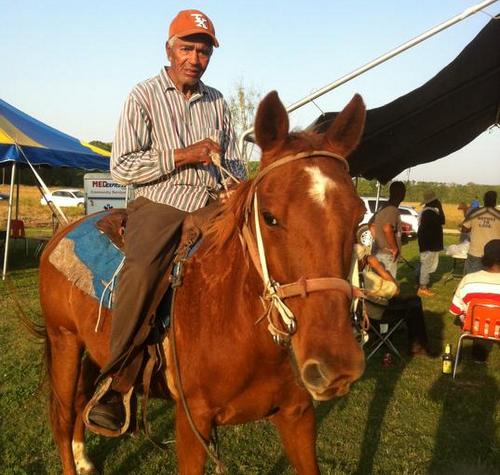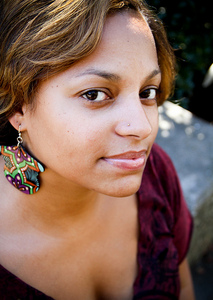
jewel bush.
“House Made of History, Sanctuary against Sorrow.”
Originally published in the Uptown Messenger.

William “Will” Rideau (1936-2013) is shown on his horse LeBeau. (family photo)
Over the weekend, I traveled to St. Landry Parish, the heart of Creole and Cajun culture and heritage in Louisiana, to attend my great-uncle’s funeral.
My great-uncle Will was a tall, agreeable man who lived a simple life wearing flannel shirts, loving baseball, family and above all horses — horse training, horse riding and horse betting. He never left home, literally. He spent his entire 77 years living in the same quaint cabin tucked deep into the woods of Rideau Settlement on our family’s original homestead, land purchased for $25 an acre by his father.
Rideau Settlement is where I evacuated in 2005 along with about 20 other relatives when Hurricane Katrina’s wrath pushed us and so many others out of New Orleans. I spent two weeks in this un-GPSable St. Landry Parish village, where my cell phone didn’t work, where there were no streetlights, where everyone woke at sunrise, where everyone identified you by who your parents or grandparents were.
It had been nearly eight years since I had last visited my familial land; then due to tragedy — and now due to tragedy.
After the funeral services at Immaculate Conception Catholic Church, founded in 1897 by the Josephite Fathers and widely referred to as LeBeau church, the kinfolk made a pilgrimage to Uncle Will’s house to pay respects beyond the gravesite.
In the diminutive country cemetery where so many of my ancestors rest — Bush, Romar, Rideau — I snapped pictures of headstones: my maternal grandfather’s grandfather, Oscar Bertrand, to whom everyone says my mother bears a remarkable resemblance; my paternal grandfather, Bean, who was a World War II Veteran and school bus driver; and my uncle, June, his son, who served in the Vietnam War. In my family, nicknames are better known and used than given names.
I stood on the Rideau’s 33 acres, surveying chicken coops, assorted sheds and storage facilities, pecan trees and a maze of fences in the pasture, still rigged in various ways to prevent my uncle’s beloved horses from escaping; a relic of his ingenuity, even though it’s been a number of years since he was well enough to care for animals.
Touring my uncle’s yard, dodging ant piles with sweat soaking my funeral clothes, a flood of memories washed over me. I remembered where I posed, under the oak tree with some cousins, where we gathered on the property for my great grandmother’s funeral back in 1982. Then, my mother removed the dress I wore to the funeral because she didn’t want me to ruin it playing outside. For years since, I have frowned at my boyish attire in that portrait — a green cotton jersey, shorts and pink slippers.
One night during my Katrina evacuation there, I was walking between the two family homes on the grounds. It was pitch-black and I was holding my son, who was 3 years old at the time. My uncle’s quarter horses, LeBeau and Annabelle, began to trot in our direction. Annabelle, who has since died, was about 26 years old at the time and LeBeau, who was sold a year or so ago, was 10 or younger. I frantically began calling my uncle’s name. I wasn’t used to being so close to large animals or having them move quickly toward me, especially in the dark. My uncle rushed to escort us without complaint.
These creatures, Annabelle and LeBeau, were gentle and friendly. They had no clue how intimidating their size was to city folks like me and the yard full of other displaced New Orleanians, who, due to disaster, were forced to reconnect with their roots. For my son, being there with Uncle Will in the country was a vacation. He rode horses every day — LeBeau or Annabelle — and soiled the three changes of clothes I packed for him playing hard in the open fields to the point I just threw them away instead of fighting to clean them.
I saw one of my uncle’s well-worn saddles on the back porch, the same porch where one of his horses ate my aunt’s watermelon during our Katrina stay. She was livid when it happened. In the aftermath of the storm, before we had a chance to survey the damages back in New Orleans, personal property became even more important in light of not knowing how much of it had been lost at home in the city. We laugh about it today; and we laugh about how my uncle’s horses would walk up to us begging to be pet or fed — the way dogs do — a pear or fig from the yard.
A sturdy wooden cupboard built more than 80 years ago by my uncle’s father, my great-grandfather, stands in my uncle’s kitchen, part of the house he too built nearly a century ago. His tithing envelopes on his bedroom dresser, his neatly made bed and one of his signature striped, button down shirts hang in his room wait for the man who will not return there in flesh.
Based on the recent state of world affairs — an avalanche of tragedy and death — even the eternal idealist could be converted into a seething pessimist building a case that there is an absence of good in the whole, entire universe.
But I can see beauty in the world, even in the midst of bereavement, in the preservation of my family’s land and history.
jewel bush, a New Orleans native, is a writer whose work has appeared in The (Houma) Courier, The Washington Post, The Times-Picayune, New Orleans Homes & Lifestyles Magazine, and El Tiempo, a bilingual Spanish newspaper. In 2010, she founded MelaNated Writers Collective, a multi-genre group for writers of color in New Orleans dedicated to cultivating the literary, artistic and professional growth of emerging writers. She is currently communications coordinator for Service Employees International Union Local 21LA. Her three favorite books are Their Eyes Were Watching God, The Catcher in the Rye, and Are You There God? It’s Me, Margaret.
Text prepared by:
- Bruce R. Magee
Source
bush, jewel. "House Made of History, Sanctuary against Sorrow." Uptown Messenger. N.p., 30 July 2013. Web. 10 June 2014. <http:// uptown messenger.com/ 2013/ 07/ jewel-bush-house-made-of-history-sanctuary-against-sorrow/>.

